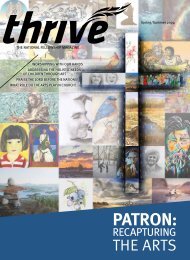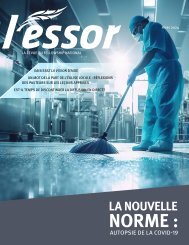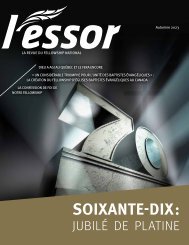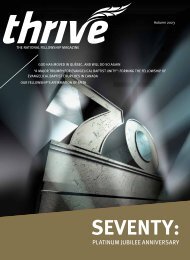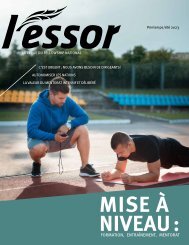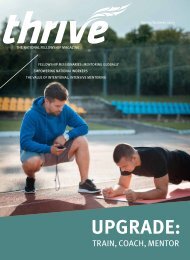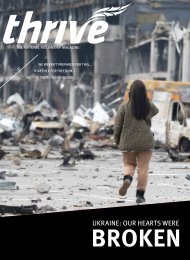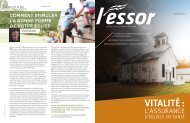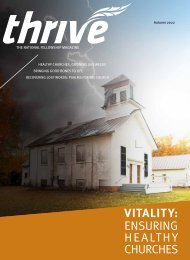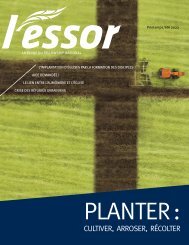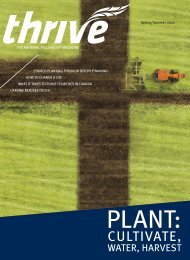Winter 2024
The New NORM: A COVID-19 Postmortem
The New NORM: A COVID-19 Postmortem
Create successful ePaper yourself
Turn your PDF publications into a flip-book with our unique Google optimized e-Paper software.
<strong>Winter</strong> <strong>2024</strong><br />
CATCH THE VISION OF FAIR<br />
A WORD FROM THE LOCAL CHURCH: FELLOWSHIP<br />
PASTORS REFLECT ON LESSONS LEARNED<br />
IS IT TIME TO SHUT DOWN THE LIVESTREAM?<br />
THE NEW<br />
NORM:<br />
A COVID-19 POSTMORTEM
<strong>Winter</strong> <strong>2024</strong><br />
THE<br />
NEW<br />
NORMAL?<br />
by Steve Jones<br />
THE FIRST WORD<br />
During the COVID-19 pandemic, many of us were asking ourselves how the Church should behave while experiencing<br />
a world-wide crisis. In one article, I asked: what would Jesus do? Or Luther or Paul? Pandemics are not new to humanity,<br />
nor to the Church. Historian Vivian Nutton wrote that between the 14th and 18th centuries “a town would experience<br />
an epidemic or plague approximately every decade and a serious devastation once in a generation.” We experienced a<br />
generational event. Has it also caused a societal shift? Or, even closer to home, has it caused a cultural shift in how we do<br />
Church?<br />
WE ARE NOW TWO YEARS PAST LOCKDOWNS, RESTRICTIONS, AND FEAR OF AN<br />
UNKNOWN VIRUS. ARE LOCAL CHURCHES BACK TO NORMAL, OR IS THERE A NEW<br />
NORMAL?
thrive-magazine.ca<br />
thrive / 3<br />
A few years ago, we discussed how we should behave during COVID-19. In this<br />
edition of Thrive, we investigate how the local church has settled post-pandemic.<br />
Are there any changes? If so, are they temporary or permanent? How are<br />
worship service attendance, offerings, volunteer numbers? Has the intensity<br />
of internal conflict within our churches decreased or disappeared? What sorts<br />
of hybrid worship forms and expressions are here to stay? A recent Hartford<br />
Institute Religion Research Study funded by the Lilly Endowment discovered<br />
75% of churches in the USA offered both in-person and virtual worship services<br />
in these post-pandemic days. The same study reported that churches who had<br />
a greater virtual presence saw their offerings increase dramatically by 150%. Is<br />
that happening in our Fellowship churches?<br />
HOW ARE WE ENCOURAGING ENGAGEMENT<br />
BETWEEN CHURCH MEMBERS? HOW DO<br />
WE ENGAGE VIRTUAL ATTENDERS BEFORE,<br />
DURING, AND AFTER WORSHIP GATHERINGS?<br />
IS COMMUNITY GOING TO SUFFER OVER TIME?<br />
WILL VIRTUAL WORSHIP SERVICES BECOME<br />
AN INCREMENTAL STEP FOR CHURCHES TO<br />
BECOME PASSIVELY DE-CHURCHED AND<br />
ULTIMATELY UN-CHURCHED?<br />
These are but a few of many questions we should be asking. We’ll seek to identify<br />
answers and possibly discover some of the trends in this edition of Thrive,<br />
“The New Norm: A COVID-19 Postmortem”.<br />
Steven Jones<br />
is President of<br />
The Fellowship<br />
of Evangelical<br />
Baptist Churches<br />
in Canada. Follow<br />
Steve on Twitter @<br />
FellowshipSteve.
4 / thrive <strong>Winter</strong> <strong>2024</strong><br />
THE FELLOWSHIP’S THEME VERSE FOR <strong>2024</strong> IS:<br />
“LET US SHOW THE TRUTH BY OUR ACTIONS.”<br />
1 JOHN 3:18B (NLT)<br />
11 JOURNEY WITH A CHILD<br />
You can connect with us on FACEBOOK:<br />
www.facebook.com/thefellowshipca,<br />
on INSTAGRAM: @thefellowshipca,<br />
and on TWITTER: @thefellowshipca.<br />
Come and join the conversation.<br />
2 THE FIRST WORD<br />
THE NEW NORMAL / Steve Jones<br />
5 FOUNDATION<br />
POST-COVID-19: ARE YOUR AFFAIRS IN<br />
ORDER? / Gord Baptist<br />
6 OUT THERE<br />
COVID-19 AND THE MISSION FIELD: WHAT<br />
CHANGED? / Ben Porter<br />
10 LOVE EXTENDED<br />
FAREWELL FROM DAN SHURR<br />
WEATHERING THE STORM APPEAL: UPDATE / Sunny Lee<br />
INTRODUCING NORTON LAGES: THE<br />
FELLOWSHIP’S NEXT FAIR DIRECTOR!<br />
CATCH THE VISION OF FAIR / Denise Wicks<br />
12 GROUND WORK<br />
HOW THE PANDEMIC AFFECTED EVANGELISM AND CHURCH<br />
PLANTING PROJECTS IN QUÉBEC / Hugo Éthier<br />
DID COVID-19 CHANGE CHAPLAINCY? / Larry Freeman<br />
14 UP TO SPEED<br />
PANDEMIC LESSONS FROM COAST TO COAST: REGIONAL<br />
UPDATES<br />
A WORD FROM THE LOCAL CHURCH: FELLOWSHIP PASTORS<br />
REFLECT ON LESSONS LEARNED<br />
20 TRUTH TALK<br />
SEMINARIES POST-PANDEMIC: WHAT HAS CHANGED?<br />
22 THE LAST WORD<br />
IS IT TIME TO SHUT DOWN THE LIVESTREAM? / Paul Carter<br />
MISSION STATEMENT: Thrive is the official magazine of The Fellowship of Evangelical Baptist Churches in Canada. It is published to enhance the life and ministry of church leaders and<br />
members in Fellowship congregations by providing articles, resources, and news that reflect evangelical values, a common mission, and a shared sense of identity and vision. Thrive is published<br />
three times per year and is available in English and French.<br />
© The Fellowship of Evangelical Baptist Churches in Canada<br />
MINISTRY CENTRE: P.O. Box 457, Guelph ON N1H 6K9<br />
T: 519-821-4830 F: 519-821-9829<br />
EMAIL: president@fellowship.ca<br />
thrive-magazine.ca<br />
SENIOR EDITOR: Steven Jones MANAGING EDITOR: Valerie Heaton<br />
COPY EDITOR: Jesskah McCartney LAYOUT & DESIGN: Ampersand<br />
EMAIL: thrive@fellowship.ca<br />
POSTAGE: Return undeliverable Canadian address to Circulation<br />
Department, P.O. Box 457, Guelph ON N1H 6K9<br />
THE FELLOWSHIP CHILD<br />
SPONSORSHIP PROGRAM<br />
Have you heard about the Fellowship Child Sponsorship<br />
Program? Overseen by Fellowship International missionaries,<br />
children are provided with holistic care in residential and<br />
non-residential settings. Sponsorship provides love for today<br />
and hope for tomorrow within five locations across four<br />
countries: Casa Hogar (Honduras), Cedar Home (Lebanon),<br />
Clementia Life Centre (Lebanon), Joy Foundation (Dominican<br />
Republic), and Love Trust (Sri Lanka). Visit fellowship.ca/<br />
ChildSponsorship to learn more.<br />
EPIC and Onside is a Gospel-centred, Kingdom-centric organization<br />
that partners with local churches to help families<br />
thrive by fostering growth — emotionally, spiritually, physically,<br />
and relationally — while connecting churches to their<br />
communities through faith, sport, and creativity.<br />
EPIC and Onside have partnered with churches to run<br />
camps, sports leagues, PA Day camps, STEM programs, and<br />
other outreach programs for the community for the past 10<br />
years. How can EPIC and Onside support your community<br />
initiatives? Visit epicandonside.ca for more information.
foundation<br />
POST-COVID-19:<br />
ARE YOUR<br />
AFFAIRS<br />
IN ORDER?<br />
by Gord Baptist<br />
According to Stats Canada, 54,276<br />
deaths have occurred related to<br />
COVID-19. 1 According to the Angus<br />
Reid Institute, more than half of<br />
Canadians (51%) do not have a Last<br />
Will and Testament in place. 2 These<br />
numbers underscore how necessary<br />
it is to ensure that your estate<br />
planning is up-to-date. For those that<br />
don’t have a Will, consider having one drafted to avoid estate<br />
distribution conflicts such as family litigations, potential<br />
probate fees, and, of course, paying unnecessary estate taxes.<br />
For those who already have a Will, check to make sure this<br />
document is up-to-date. Do you have a valid executor and<br />
alternate executor? Have beneficiaries or your spouse passed<br />
on? Is your lawyer still in practice?<br />
If you need help drafting or updating your Will, please contact<br />
me using the information below and I’ll be glad to work with<br />
you to ensure that your Will is kept up-to-date and viable.<br />
— Gord Baptist is Fellowship Advancement Director<br />
and can be reached at 519.821.4830, ext. 244,<br />
fax: 519.821.9829, gbaptist@fellowship.ca.<br />
1<br />
Government of Canada Website, accessed on October 23, 2023: health-infobase.canada.ca/covid-19/current-situation.<br />
html?stat=num&measure=deaths_total&map=pt#a2.<br />
2<br />
Angus Reid Institute Website, accessed October 23, 2023: angusreid.org/canada-will-testament-intestate-dying-without-will/#:~:text=New%20data%20<br />
from%20the%20non,this%20subject%20five%20years%20ago.<br />
MAY IS “LEGACY-GIVING MONTH”<br />
Doing God’s will through your Will.<br />
As believers, we are called to recognize that everything we have belongs to God. Actually,<br />
EVERYTHING belongs to God. Deuteronomy 10:14 (NIV): “To the LORD your God belong the<br />
heavens, even the highest heavens, the earth and everything in it.”<br />
As good stewards, we are called to distribute this blessing in accordance with His will. We<br />
are to honour Him in our tithes and offerings, in being generous to the poor, and by taking<br />
care of our family — not only while we are alive, but also when we pass on, which can be<br />
done through Legacy Giving.<br />
Legacy Giving shows your devotion to God’s stewardship principles and blesses Kingdom<br />
ministries for years to come, teaching your children and family members about the importance<br />
of giving generously as the Lord commands. To raise awareness of the importance<br />
of Legacy Giving, we have dedicated the month of May as “Legacy Giving Month”.<br />
A 2022 Angus Reid poll discovered that only 12% of Canadians planned to<br />
leave a legacy gift to charity in their Estate. This May, you can decide to<br />
leave a legacy gift to the Fellowship Foundation, blessing the ministries<br />
you are committed to in life and death. For help with legacy giving<br />
or other Estate matters, please contact Gord Baptist, Fellowship<br />
Advancement Director at 519.821.4830, ext. 244;<br />
fax: 519.821.9829; gbaptist@fellowship.ca.<br />
FOUNDATION
<strong>Winter</strong> <strong>2024</strong><br />
COVID-19 AND<br />
THE MISSION FIELD:<br />
WHAT CHANGED?<br />
by Ben Porter<br />
OUT THERE: FELLOWSHIP INTERNATIONAL<br />
BEN PORTER,<br />
FELLOWSHIP<br />
INTERNATIONAL<br />
DIRECTOR<br />
><br />
For our missionaries who are usually<br />
running at 100 km/hour, the<br />
pandemic was probably the only thing<br />
that could bring everyone to a halt.<br />
When governments started mandating<br />
lockdowns, we encouraged our<br />
Fellowship International missionaries<br />
to take this rare chance to reset, revise,<br />
and refocus.<br />
With fields across the globe, the pandemic<br />
looked different for each of our<br />
missionaries. There was, however, one thing that was the<br />
same: our missionary family came out of the gate running<br />
once restrictions were lifted. Like a race horse bursting out<br />
onto the track, our missionaries hit the ground running,<br />
propelled by renewed strength and vision.<br />
Since the pandemic, I’m thrilled to share that our God-sized<br />
vision of multiplication through movements is no longer<br />
just a theory, but a reality. We are seeing the beginning<br />
sparks of movements as our missionaries are making disciples<br />
who make more disciples in Jesus’ name.<br />
From September 2022 to August 2023, our missionaries<br />
reported 547 Discovery Bible Studies, 399 baptisms, 429 national<br />
leaders trained, and more. And this fiscal year, we’re<br />
already on track to double some of these numbers!<br />
God is moving in extraordinary ways, and we can’t do our<br />
work without YOUR extraordinary prayer. Please join us<br />
in our newly launched Prayer Room to pray alongside our<br />
missionaries!<br />
Join the online Prayer Room<br />
to connect with Fellowship<br />
International missionaries<br />
to hear prayer and ministry<br />
updates!<br />
fellowshipinternational.engagespaces.com<br />
ROB AND KATHRYN<br />
FLEMING, FELLOWSHIP<br />
MISSIONARIES IN JAPAN<br />
The pandemic was a bit of<br />
a bore for Japanese people.<br />
Wear masks and stay two<br />
meters apart? Been there,<br />
done that. Masks have<br />
been a hay fever remedy<br />
for many years. Also, the<br />
Japanese bow from a distance, they don’t hug! Kathryn and<br />
I thought we were heading to a new city near Tokyo when<br />
we returned to Japan in September 2020, but God used the<br />
pandemic to nudge us further north to the same city where<br />
we had spent most of our 30 years in Japan.<br />
Since our return, God has given Kathryn the opportunity<br />
to begin regular Discovery Bible Studies with many non-<br />
Christian Japanese ladies in our community. Rob has established<br />
a good connection with five small Japanese churches<br />
where he preaches/teaches weekly. One highlight from<br />
Rob’s itinerant ministry post-pandemic is the husband<br />
of a Christian wife in Sakura. He came to hear a “funny”<br />
Canadian preacher talk about important things and went<br />
home with Jesus as his Saviour!<br />
DIEGO AND CLAUDIA<br />
CARDONA, FELLOWSHIP<br />
MISSIONARIES IN<br />
COLOMBIA<br />
Claudia talks by phone to<br />
María, while on her computer<br />
she reviews the list<br />
of families without food,<br />
medicine, or money to pay<br />
for their home utilities.<br />
She then talks with an elderly woman about what to do to<br />
preserve the body of her brother who has just died from<br />
COVID-19; there is no other person who can help, and no<br />
one will approach her house. Claudia is inquiring about<br />
the cleaning chemicals that this woman has in her home,<br />
to help minimize the threat to public health. This is one of
thrive-magazine.ca<br />
thrive / 7<br />
...OUR<br />
MISSIONARIES<br />
HIT THE GROUND<br />
RUNNING,<br />
PROPELLED<br />
BY RENEWED<br />
STRENGTH<br />
AND VISION.<br />
the most dramatic stories we experienced during the<br />
pandemic, but there were also stories of love and solidarity<br />
that made us cry joyful tears.<br />
Our ministry in Colombia grew during the pandemic. New<br />
believers, a revolutionary growth of small home groups, numerous<br />
resources put online, and new workers. All this taught<br />
us some lessons. First, God is faithful in caring for His people,<br />
providing, and using us to bring the Gospel to others. Second,<br />
we are much more vulnerable than we are willing to admit.<br />
Third, this can happen again, and we are better prepared now<br />
than before.<br />
INGRID AND RICARDO<br />
CASTRO, FELLOWSHIP MIS-<br />
SIONARIES IN SPAIN<br />
Before the pandemic, we were<br />
helping a group of Christians<br />
in Llerena with no access to<br />
computers and limited digital<br />
knowledge. We were able to<br />
train them in the Discovery<br />
Bible Study (DBS) format successfully.<br />
When the pandemic hit, we continued to follow the<br />
group through WhatsApp, the only application they managed<br />
quite well with their phones. When we tried to restart in-person<br />
meetings, the group seemed to have vanished, with many<br />
having moved away. As we were moving from Extremadura to<br />
Sevilla, we thought this group had died. Imagine our surprise<br />
when they restarted meeting online! The same core couple<br />
initiated the meetings from their new location, and they do so<br />
consistently every Friday. Not only has the DBS format empowered<br />
them, but the pandemic gave them the confidence to use<br />
a digital tool to follow the group and help it grow in spite of<br />
geographical barriers.<br />
KARIM AND RITA ANAYSSI, FELLOWSHIP MISSIONARIES<br />
AT CEDAR HOME IN LEBANON<br />
Since its inception in 1950, Cedar<br />
Home NEVER shut its doors until<br />
Lebanon was hit with COVID-19<br />
and the Ministry of Social Affairs<br />
required that we shut down our<br />
residential operations. Half of our<br />
girls had no family to go back to.<br />
We had to make the best decisions<br />
in a short amount of time<br />
in order to secure a safe place for<br />
each girl.<br />
There were three factors for success: the first was the amazing<br />
relationship with the families of the girls who had them. After<br />
years of consistent love, trust, and coaching, the girls who had<br />
a parent or extended family were able to go back and live with<br />
them, with all the relief needs of the household provided for<br />
by Cedar Home, along with weekly visits. The second factor<br />
for success was the church: the few girls who had no family or<br />
who, for safety reasons, couldn’t be with their families were<br />
so lovingly taken care of by families from church. The third<br />
factor was our team who maintained the same quality of work<br />
and dedication to make sure our girls continued to receive<br />
love and care.<br />
In 2020, we were allowed to re-open. The girls and team were<br />
so happy to be back, and the pandemic left us with a gift: the<br />
opportunity to start and continue the relief program for needy<br />
families.<br />
...THE PANDEMIC LEFT US WITH A GIFT: THE OPPORTUNITY<br />
TO START AND CONTINUE THE RELIEF PROGRAM FOR NEEDY FAMILIES.
love extended<br />
<strong>Winter</strong> <strong>2024</strong><br />
FAREWELL FROM DAN SHURR<br />
It has truly been a pleasure for me to serve the last 15 years in the Fellowship National Ministry<br />
Centre, and I am grateful for the opportunity to serve as FAIR Director since 2015. This has<br />
been a passion for me, not just a job. I sensed deeply God’s calling and gifting for this role.<br />
Seeing God at work in our world has been a special opportunity, and sharing these experiences<br />
with Fellowship churches and donors has been a highlight. I want to thank each<br />
person I have served with in the FAIR department over the years; more recently, Norman<br />
Nielsen, Denise Wicks, and Paul Hildebrand — you have enriched my life.<br />
With much gratitude,<br />
Dan Shurr, FAIR Director 2015-2023<br />
WEATHERING THE STORM<br />
APPEAL: UPDATE by Sunny Lee<br />
LOVE EXTENDED: FAIR<br />
The pandemic may feel like a distant memory, but it<br />
wasn’t too long ago that our Fellowship International<br />
missionaries had to pivot their entire ministries. It affected<br />
every part of our lives, including how we got our groceries,<br />
how we attended church, how we interacted with our family<br />
and friends, and beyond.<br />
In the Fall of 2020, FAIR responded to the pandemic with<br />
the Weathering the Storm appeal. Thanks to your generosity,<br />
we raised $160,000, doubling our initial fundraising goal!<br />
Funds were used to purchase food and household essentials<br />
and, in some cases, provide rent support for families.<br />
Your giving impacted thousands of lives through our<br />
Fellowship missionaries and their ministries: Diego and<br />
Claudia Cardona (Colombia), Karim and Rita Anayssi and<br />
Bechara and Roula Karkafi (Lebanon), Edwin and Helmi<br />
Karwur (Indonesia), Ronald Jeyaseelan (Sri Lanka), the<br />
Walls (France), stranded international students in Canada,<br />
and in the area surrounding Shikarpur Christian Hospital<br />
(Pakistan).<br />
One country that was notably impacted by the pandemic<br />
was Lebanon, where Karim and Rita Anayssi run Cedar<br />
Home, and Bechara and Roula Karkafi oversee Clementia
thrive-magazine.ca<br />
thrive / 9<br />
Life Centre. In 2020, not only was Lebanon affected by<br />
COVID-19 like the rest of the world, but they were also facing<br />
the aftermath of the Beirut explosion and a staggering influx<br />
of Syrian refugees. During this crippling darkness, your donations<br />
through FAIR’s Weathering the Storm appeal allowed<br />
our missionaries to shine Christ’s light.<br />
Roula shares, “Thanks to your support, we were able to<br />
launch the vocational training program for Syrian refugee<br />
teenagers who had to join the workforce to assist their<br />
families, preventing them from continuing their education<br />
with us!”<br />
Today, our missionaries and their ministries are thriving,<br />
having overcome the difficulties of the pandemic.<br />
Thank you for your ongoing prayer and financial<br />
support that propels us in our mission to alleviate<br />
suffering and injustice in Christ’s name.<br />
— Sunny Lee is an Administrative Assistant for<br />
Fellowship International.<br />
INTRODUCING<br />
NORTON LAGES:<br />
THE FELLOWSHIP’S<br />
NEXT FAIR DIRECTOR!<br />
We are pleased to announce<br />
that Norton Lages of Montréal,<br />
QC has accepted the call to<br />
become our next FAIR Director,<br />
commencing March 1, <strong>2024</strong>.<br />
Norton is married to Tatiana (Tati)<br />
and together they followed God’s<br />
clear call nine years ago to leave<br />
Brazil to serve God in Québec. They<br />
have been church planters (with Église 21), and Norton<br />
is cofounder of Mission Québec and is current Director of<br />
Development for AEBEQ. Norton and Tati served with World<br />
Changers International and Metamorfose, two relief ministries<br />
working in impoverished neighbourhoods in Salvador,<br />
Brazil, along with serving on the Baptist World Alliance Human<br />
Rights Advocacy Committee working in areas of freedom and<br />
justice.<br />
Norton is Brazilian by birth and a Canadian citizen. He is fluent<br />
in four languages: Portuguese, English, French, and Spanish–a<br />
tremendous asset as many FAIR projects are located in countries<br />
where these languages are predominant. He has a Master<br />
of Missiology (Southeastern Baptist Theological Seminary, North<br />
Carolina), a Master of Business Administration (Salvador University,<br />
Salvador, Brazil), and a Bachelor of Arts in Social Communications in<br />
Marketing (Polifucs College, Salvador, Bahia, Brazil).<br />
Join us as we welcome Norton to the Fellowship National staff this<br />
March!
10 / thrive <strong>Winter</strong> <strong>2024</strong><br />
CATCH<br />
THE VISION<br />
OF FAIR by<br />
Denise Wicks
thrive-magazine.ca<br />
HAVE YOU EVER BEEN ON THE<br />
RECEIVING END OF THE GIFT OF<br />
MERCY AND COMPASSION? I HAVE.<br />
My son was born with a lung defect in March 2021. We spent the<br />
first week of his life in the NICU in a hospital that was a 45-minute<br />
drive from our home. During that time, we were blessed by a<br />
well-known secular charity which fed and housed us only one short<br />
block away from the hospital. The first day we arrived there, I wept and praised God for His<br />
provision in a time of great need. The organization may not have done their work in the<br />
name of Christ, but God surely used them to minister to us in those days.<br />
I often think of the care we received. It met our physical needs more completely than we<br />
could have imagined. The only thing it lacked was spiritual care. In our case, my husband<br />
and I had hope and faith in Christ, and we had our church family, who prayed with us and<br />
encouraged us every step of the way. But what about the other families? Was there anyone<br />
praying for them through the isolation of hospital visits in the midst of pandemic restrictions?<br />
Where were they placing their hope? I also think about families in countries where<br />
healthcare is difficult to access. How devastating to know that your child is fighting for<br />
their life and you can’t help them. What hope do they cling to in times of need?<br />
Life has taught me the importance of serving with both word and deed. You can’t truly meet<br />
a person’s needs without the truth and hope of the Gospel.<br />
FAIR’s mission is to alleviate human suffering and social injustice. How this plays out is<br />
different in each situation, but the core principle remains – providing holistic care through<br />
local believers. There’s no perfect formula, but when the global Church gives so that the local<br />
Church can minister in the name of Christ to the whole person, hearts become open to<br />
hearing the Gospel, and God’s Kingdom is built.<br />
This winter, FAIR’s Catch the Vision special appeal seeks to highlight four FAIR projects and<br />
raise $160,000 to help provide holistic care through Fellowship International missionaries<br />
and the local Church. Whether it’s surgical training in Madagascar, helping marginalized<br />
communities in Sri Lanka, vocational training in Pakistan, or supports for inmates in the<br />
MENA and Stan regions, each project offers both the truth of the Gospel and tangible love<br />
in action.<br />
I hope and pray you will “catch the vision” of FAIR and choose to help bring mercy and<br />
compassion to those who need it through this special appeal.<br />
— Denise Wicks is a FAIR Projects and Promotion Coordinator.<br />
PARTNERING TO END ONLINE SEXUAL EXPLOITATION<br />
OF CHILDREN IN THE PHILIPPINES<br />
International Justice Mission (IJM) has been one of FAIR’s partner organizations since 2015. Since the beginning,<br />
the partnership has been focused on supporting their work to end online sexual exploitation of<br />
children in the Philippines. Over the years, FAIR has promoted three special appeals which have raised<br />
$426,000 to help fund rescue operations and establish an aftercare and specialized foster program for survivors.<br />
There is still much work to be done, but we celebrate every young life rescued and pray for justice for<br />
perpetrators and survivors alike.
ground work<br />
<strong>Winter</strong> <strong>2024</strong><br />
HOW THE PANDEMIC AFFECTED<br />
EVANGELISM AND CHURCH PLANTING<br />
PROJECTS IN QUÉBEC<br />
by Hugo Éthier<br />
GROUND WORK: FRANCOPHONE MINISTRY<br />
Like the majority of people on our<br />
planet, evangelism and church<br />
planting projects in Québec have<br />
been affected by the recent pandemic.<br />
Looking at the various effects, we can<br />
see both rejoicing and heart-breaking<br />
examples. Among the encouraging<br />
effects, we can mention the switch to<br />
online broadcasting of worship services<br />
and preaching. During the pandemic, we heard several<br />
stories of people coming closer to the Gospel, and even<br />
being converted, thanks to going online. Churches have<br />
also had to learn to meet virtually, and what was at first<br />
bizarre became advantageous for many. Of course, we miss<br />
some of the important elements of face-to-face meetings,<br />
but we can come together more often, in greater numbers,<br />
to share and pray. The pandemic also increased worry and<br />
anxiety levels, which prompted many people to seek answers<br />
and security in the area of faith. Several testimonies<br />
were given of contacts and even conversions to Christ due<br />
to the anxiety created by the pandemic.<br />
What was less encouraging was the fact that many people,<br />
who had previously been weak in their faith, dropped out<br />
of various groups’ meetings. Considering that evangelism<br />
and church planting projects often include seekers and/<br />
or new Christians, some of them were drawn away from<br />
the faith. Many young church plants experienced financial<br />
pressure as well.<br />
What we can conclude is that the Lord Jesus is sovereign,<br />
that we have seen His good hand throughout this surprising<br />
period, and that the “final balance sheet” is generally<br />
encouraging.<br />
— Hugo Éthier is lead pastor at Renaissance Evangelical<br />
Baptist Church in Rivière-des-Prairies, Montréal, a<br />
former church planter in Riviere-du-Loup, and a former<br />
mathematics teacher. He serves as Fellowship National's<br />
Francophone Coordinator.<br />
If you’d like to learn more about evangelistic and church planting projects<br />
in Québec or to see how you can partner with us, join us for our next virtual<br />
Québec Vision Tour on March 7, <strong>2024</strong>. Contact Hugo Éthier by email at<br />
hethier@fellowship.ca or by phone at 514.799.7704.
thrive-magazine.ca thrive / 13<br />
DID COVID-19 CHANGE<br />
CHAPLAINCY? by Larry Freeman<br />
When one thinks of chaplaincy<br />
ministry, the phrase “ministry of<br />
presence” often comes to mind — being<br />
physically present in the life and lifesituations<br />
of others. The pandemic was<br />
both a challenge and a blessing to our<br />
Fellowship chaplains. Some could no longer<br />
be present physically and had to pivot<br />
to the use of technology, while others<br />
had doors of opportunity open up. Where are we now? Here are<br />
comments from three Fellowship chaplains:<br />
Mike Garabedian, lead chaplain at Toronto Pearson<br />
International Airport writes: “Our opportunities have shifted<br />
since the pandemic. We used to experience steady numbers<br />
at our ‘services’, but we have never recovered those numbers.<br />
We’re coming across many who have disconnected from their<br />
local churches. This has caused us to rethink some of our approaches.<br />
First, we’re mentoring and equipping our chaplains<br />
to minister in this context, and second, we’re offering them<br />
resources that can be applied in short timeframes. Since most<br />
of our ministry revolves around airport employees, we can be<br />
intentional in our subsequent interactions as we follow up with<br />
their progress.”<br />
Alex Krause is a military chaplain in Cold Lake, AB and he<br />
writes: “The military chaplain context changed during the<br />
pandemic because many of us were unable to do ministry of<br />
presence in a regular way. So, as with everyone else, we had to<br />
get creative and put things online. We also started doing online<br />
Sunday services. Many chaplains were busy helping military<br />
members with obtaining religious exemption from getting the<br />
COVID-19 vaccine. This was a hard time for many chaplains<br />
weighing religious belief against government mandate. For the<br />
most part, however, things have gotten back to normal for military<br />
chaplains.”<br />
The last word will go to Charlie Lyons, Legislative chaplain at<br />
Queens Park in Ontario. He writes: “Pandemic-era chaplaincy<br />
revealed a palpable two-edged sword of presence. Early on, we<br />
learned the tough lesson that more could be accomplished by<br />
meeting virtually than many of us initially thought; virtual<br />
connections played a critical role when in-person appointments<br />
were impossible. Then, as restrictions loosened and in-person<br />
engagement returned, the growing realization was that our<br />
temporary pandemic screen time was the digital understudy to<br />
the leading star role of physical proximity — a less-than-ideal yet<br />
necessary component of the holistic performance of presence.”<br />
— Larry Freeman is Fellowship Chaplaincy Coordinator.
<strong>Winter</strong> <strong>2024</strong><br />
PANDEMIC LESSONS FROM COAST<br />
TO COAST: REGIONAL UPDATES<br />
by Valerie Heaton<br />
Each of our five Fellowship Regions faced different circumstances and challenges during the<br />
COVID-19 pandemic. Below we hear from our Regional Directors about the changes their Regions<br />
underwent and the lessons learned throughout the last four years.<br />
UP TO SPEED: REGIONAL UPDATES<br />
Q: What lessons have our church leaders learned since the pandemic<br />
ended?<br />
Andrew Swanson, Acting Regional<br />
Director, Fellowship Atlantic:<br />
“Church leaders have had to learn to be<br />
flexible, and that most of our normal<br />
statistics could not help us define what<br />
success looked like during the pandemic.<br />
Mostly, they have had to learn<br />
to hope in God. They have also had to<br />
discern where to adapt ministry to our changing world and<br />
where to stand firm.”<br />
Louis Bourque, Regional Director,<br />
AEBEQ:<br />
“We saw opened doors for government<br />
and society to dialogue about why<br />
churches are important, useful, and an<br />
essential community service. The strain<br />
highlighted which church members<br />
were engaged and which were consumers.<br />
COVID-19 exhausted our leaders because none of us<br />
knew how to react, and those who were the most exhausted<br />
tended to be rigid or limited with technology.”<br />
Tom Haines, Regional Director,<br />
FEB Central:<br />
“Leaders have learned that the<br />
Church has been in greater need<br />
of renewal than we previously<br />
thought. Many realized events<br />
and strategies can’t replace zeal for<br />
the Gospel. Leaders were forced<br />
to answer the question: ‘what are the right hills to die<br />
on?’ They learned how easy it is for third-level truths<br />
to become first-level when the Church is not deeply<br />
grounded in the Great Commandment and the Great<br />
Commission.”<br />
Mark Breitkreuz, Regional<br />
Director, Fellowship Prairies<br />
“Our leaders learned that it’s possible<br />
to have different ‘sides’ of an<br />
issue and not have to see the other<br />
side as sinful or ungodly. It can<br />
simply be a different perspective,<br />
or a different scenario that shapes the best response in a<br />
particular church’s context.”
thrive-magazine.ca<br />
thrive / 15<br />
David Horita, Regional Director,<br />
Fellowship Pacific<br />
“There are very differing opinions<br />
amongst church adherents about many<br />
important matters. We don’t all just ‘get<br />
along’. Many seem to equate their faith<br />
with freedom and rights, seeing any infringement<br />
on the part of governments as<br />
an affront to their faith.”<br />
Q: Have our priorities, ministries, or gathering spaces changed<br />
post-pandemic?<br />
Andrew: “Many of our churches have done a good job of<br />
thinking through how to better minister to our communities.<br />
We have also leaned into shared ministry between churches.<br />
Fellowship Atlantic has increasingly found that we are stronger<br />
together than we are apart.”<br />
Louis: “They developed greater intentionality and creativity<br />
in taking care of those who are isolated, sick, lonely, elderly, or<br />
unfamiliar with technology and unable to attend in person. The<br />
polarization that arose challenged our churches to remain loving<br />
and united.”<br />
“THE POLARIZATION THAT AROSE<br />
CHALLENGED OUR CHURCHES TO<br />
REMAIN LOVING AND UNITED.”<br />
Tom: “It forced them to evaluate outreach, discipleship, and<br />
worship — are we doing these effectively?”<br />
Mark: “Some have prioritized small groups more than before.<br />
Online ministry has developed and has been maintained.<br />
Gathering spaces have stayed for the most part, but leaders are<br />
more open to looking to options in the future.”<br />
David: “Ministries gradually changed back to ‘normal’ postpandemic,<br />
but we are seeing more and more interest in online<br />
church in larger churches as well as satellite churches/<br />
campuses.”<br />
Q: What have we learned about remote ministry and live streaming<br />
over the past two years, since the lockdown and restrictions were<br />
lifted? Is remote ministry here to stay? Why or why not?<br />
Andrew: “Many pastors and church leaders have expressed that<br />
they are encouraged by the ministry streaming allows them to<br />
have in their communities, but are also concerned about the<br />
number of people who think that remote ministry is of equal<br />
value as gathering in person with other believers.”<br />
Louis: “It helped us understand the importance of having online<br />
resources for the younger generation, since many will visit<br />
a church online before visiting it in person. The experience led<br />
many churches to keep an online presence in order to remain<br />
connected with our culture.”<br />
Tom: “The pandemic helped clarify the use of technology.<br />
Leaders learned not to give everything away remotely. Offer<br />
something, but also recognize that there should be more in person.<br />
Tech should be a connection point to be built on. Online<br />
services were a good touchpoint, but in-person gatherings are<br />
necessary for the ongoing health of the local church.”<br />
Mark: “I believe it is here to stay. Churches have seen it as a<br />
great outreach for non-Christians. Being able to access services<br />
online also made it easier to send to someone you feel would<br />
connect with it, or for those who can’t attend a particular<br />
Sunday to enjoy the service later.”<br />
David: “A certain (small) percentage of people/families prefer<br />
online ongoing — enough to keep it going, but not enough to<br />
see it ever rival live services.”<br />
Q: What did we learn about the Church’s relationship with government<br />
throughout and after lockdowns?<br />
Andrew: “We learned that it is always time to pray for those in<br />
authority and that we should have a heart of submission to God<br />
and those He has placed in leadership over us. We also acknowledge<br />
that we are sometimes confused about how to best live as<br />
neighbours in communities and as servants of Jesus Christ.”<br />
Louis: “COVID-19 forced a positive dialog between churches<br />
and government, either through MPs or through organizations<br />
that represent churches before the government, which has<br />
lasted — that’s a first for Québec!”<br />
Tom: “The post-Christian culture came clearly into view. We<br />
do not live in a Christian nation any longer, if we ever did. The<br />
Church is not a political entity.<br />
Leaders learned that they may<br />
have been putting too much confidence<br />
in government.”<br />
Mark: “Some relationships between<br />
church and government<br />
are good, and some are not. Some<br />
people within both groups are<br />
easier/harder to love. The simplicity<br />
of ‘love God, love others’ was<br />
helpful during times that we just<br />
lived through; that had incredible<br />
complexity built into it.”<br />
David: “Government doesn’t have<br />
to be seen as an enemy. They take<br />
the ministry community seriously<br />
and are interested in our<br />
feedback, but they cannot/do not<br />
THE SIMPLICITY<br />
OF ‘LOVE GOD,<br />
LOVE OTHERS’<br />
WAS HELPFUL<br />
DURING TIMES<br />
THAT WE JUST<br />
LIVED THROUGH;<br />
THAT HAD<br />
INCREDIBLE<br />
COMPLEXITY<br />
BUILT INTO IT.<br />
differentiate between faith groups. They see denominational offices<br />
as ‘representative’ voices of their congregations and expect<br />
them to provide feedback on behalf of their churches, which<br />
some churches do not appreciate. Pastors value being brought<br />
together, even if online, to share what’s going on in their local<br />
contexts and to see/hear how others are facing similar issues.”
16 / thrive <strong>Winter</strong> <strong>2024</strong><br />
A WORD FROM<br />
THE LOCAL CHURCH:<br />
FELLOWSHIP PASTORS REFLEC
thrive-magazine.ca<br />
thrive / 17<br />
T ON LESSONS LEARNED<br />
The Fellowship is a collection of over 500 local churches, each with unique cultures<br />
and community. The challenges faced by churches in Nova Scotia were different<br />
from those experienced by churches in British Columbia, and the lessons each congregation<br />
learned reflect this. Below we’ve gathered testimonials from Fellowship<br />
pastors and church staff across Canada sharing what their churches encountered<br />
throughout COVID-19 and beyond.<br />
Colin McMahon, Associate Pastor, Parker’s Cove Baptist Church, Granville<br />
Ferry, NS:<br />
“Due to the lack of decent internet access here, we never had the opportunity<br />
to engage in livestreaming. We would pre-record services and post<br />
them (oftentimes an upload would take 12-14 hours for a single service).<br />
We quickly realized that the effort that went into this was well worth it as<br />
those who were unable to attend church for various reasons, even postpandemic,<br />
were still able to be ministered to.”<br />
Derik Fuller, Co-Lead Pastor, Forward Church, Cambridge, ON:<br />
“We learned that the tools that allow us to do ministry online are incredible<br />
blessings that we shouldn’t throw away but instead should figure out<br />
how to best leverage for the sake of making disciples. Our online presence<br />
is the front door for people who are looking to engage with us in person.<br />
Our online services allow people to invite someone to check out a service<br />
without them having to worry that they are going to be trapped for 60 – 90<br />
minutes.<br />
“Online ministry also lets us better minister to people we have neglected in the past like shutins,<br />
parents who are stuck at home with sick kids, people who have to work on Sunday, or<br />
missionaries in the field. Whether we like it or not, our people, especially those under 40, live<br />
their lives online and in-person. To vacate the digital world is to leave where the next generation<br />
is living. If we’re serious about reaching and discipling people, we should be figuring out<br />
how to better engage them in the spaces they live — not just on Sunday, but Monday through<br />
Saturday.”<br />
Jennifer Alder, Music Director, Main Street Baptist Church, Sackville, NB:<br />
“We had to evaluate how government commands lined up with God’s<br />
commands — for the first time. Most churches were able to successfully<br />
navigate continuing with ministry while honouring the government.<br />
There were times when we felt our government was not recognizing the<br />
importance of the church’s role in the spiritual health of our communities,<br />
and were able to push back by writing to our government representatives<br />
as opposed to just breaking laws. Just how much control the government<br />
had of our gathering and movement is disconcerting; I’m thankful that we don’t live in a country<br />
where that kind of oversight is a normal part of life. I pray we don’t end up back in that type<br />
of situation again.”
18 / thrive <strong>Winter</strong> <strong>2024</strong><br />
Hugo Éthier, Pastor, Église Baptiste<br />
Évangélique de Rivière-des-Prairies,<br />
Montréal, QC:<br />
“In talking with several church leaders in<br />
Québec, I’ve found that we live in a country<br />
with a lot of individual freedoms, and if<br />
government wants to restrict our individual<br />
rights and freedoms we are reactive. Many<br />
of our churches experienced internal tensions, either at the leadership<br />
level or with members in general. Most churches found<br />
themselves somewhere between compliance and rebellion. At<br />
the theological level, we have been pushed to reflect on the Holy<br />
Scriptures and past experiences in the history of the Church to<br />
try to find the best response in the face of extraordinary governmental<br />
demands.”<br />
Pierre Tang, Senior Pastor, North York<br />
Chinese Baptist Church, Toronto, ON<br />
“Our church has three language congregations:<br />
Cantonese (Hong Kong), Mandarin<br />
(Mainland and Taiwan), and English (second<br />
and third generation). It was challenging<br />
for our leadership to maintain unity<br />
throughout the pandemic. Both Cantonese<br />
and Mandarin church members were hesitant to resume<br />
in-person meetings. As of today, we still have about 40% of<br />
Cantonese and Mandarin congregants joining the online<br />
Sunday services. Our pastoral theology is to observe communion<br />
in person, not online, which upset some. We also decided<br />
not to post worship/sermon recordings after the services.<br />
In the end, we chose to uphold the value of church life!”<br />
prolonged isolation coupled with immersion in digital media<br />
have significantly affected children and adults. So, apart from<br />
being ready to counsel, we’ve oriented our ministries around<br />
rebuilding community and strengthening relationships that<br />
have frayed over the last two years. As we’ve been intentional<br />
about deepening our love for one another, the Lord has been<br />
opening opportunities to give the Gospel to people around us.”<br />
Matt Rudd, Lead Pastor, Calvary Baptist<br />
Church, Ottawa, ON:<br />
“For our church, they’re here to stay,<br />
though perhaps in a more marginal manner<br />
than some might have imagined.<br />
We have used livestreams for outreach,<br />
blasting out videos into our community.<br />
Our small groups and board meetings are<br />
often now using hybrid formats to include people who would<br />
have been absent otherwise.<br />
“We’re both grateful for the blessings of virtual ministry and<br />
aware of its limitations. A ‘like’ or an emoji or even a ‘Good<br />
Steve Hiltz, Senior Pastor, Faith<br />
Baptist Church, NS:<br />
“We have realized afresh the<br />
value of fellowship and the great<br />
importance of building and<br />
maintaining relationships over<br />
being programmed to death, or<br />
for the sake of simply ‘running<br />
the machine’ of programs and busyness. It has<br />
made us reevaluate the root purpose of everything<br />
we do and do not do as a local church.”<br />
RJ Umandap, Lead Pastor,<br />
Crestwicke Baptist<br />
Church, Guelph, ON:<br />
“At Crestwicke, we’ve<br />
deliberately slowed<br />
down our postpandemic<br />
ministry<br />
efforts. Our leadership<br />
has been careful to allow our key<br />
ministry leaders and members ample<br />
time for rest. We also recognize that
thrive-magazine.ca<br />
thrive / 19<br />
morning!’ online is no substitute for a real smile, hug, greeting,<br />
or welcome. Singing with many voices is much more edifying<br />
to the soul than singing along with a video. Hearing the<br />
Word of God face-to-face is far superior to having the message<br />
mediated through a screen. Partaking of the physical elements<br />
of the Lord’s Supper when we come together seems to be how<br />
God intended it to happen. And the ability to pull someone<br />
aside for a conversation or to pray with them just isn't the<br />
same online.”<br />
Paul Park, Lead Pastor, South Delta Baptist<br />
Church, Delta, BC<br />
“The pandemic revealed the lack of<br />
meaningful community in our society.<br />
Despite having thousands of followers<br />
on Instagram, many people lack genuine<br />
community to which they belong. People<br />
in Vancouver frequently express that our<br />
city is a lonely city. Coming out of the pandemic, we learned<br />
that we, as a church, could offer the world a radically hospitable<br />
and meaningfully connected community that is centred<br />
around Jesus Christ—the most hospitable host that invites us<br />
to dine with Him at His royal table. Please go and read 2 Samuel<br />
9:11 and you’ll find a beautiful picture of God’s hospitality: ‘So<br />
Mephibosheth ate at David’s table, like one of the king’s sons.’<br />
How can we invite our community to dine at God’s table as His<br />
children?”<br />
Nathan Klahsen, Lead Pastor, Knollwood<br />
Baptist Church, London, ON<br />
“Our priorities shifted to starting small<br />
groups in order to help our members care<br />
for one another. Much of our church<br />
shifted to online tools, such as financial<br />
giving and a church app to help keep our<br />
people connected and in the loop. Our gathering space changed<br />
as we renovated during the pandemic, allowing us to update<br />
our technology to allow for online streaming and needed cosmetic<br />
changes. We’ve also shifted to a plurality of elders model<br />
to help care for our congregation.”<br />
WE ALSO<br />
RECOGNIZE THAT<br />
PROLONGED<br />
ISOLATION<br />
COUPLED WITH<br />
IMMERSION<br />
IN DIGITAL<br />
MEDIA HAVE<br />
SIGNIFICANTLY<br />
AFFECTED<br />
CHILDREN AND<br />
ADULTS.
truth talk<br />
<strong>Winter</strong> <strong>2024</strong><br />
SEMINARIES<br />
POST-PANDEMIC:<br />
WHAT HAS<br />
CHANGED?<br />
Just as many aspects of our daily lives were impacted by the COVID-19 pandemic, the Bible Colleges and<br />
Seminaries within our Fellowship had to change and adapt in order for students to continue their studies<br />
both during the time of restrictions and after. Below we read how these necessary changes affected life for<br />
students and staff at Northwest Seminary and College in Langley, BC, and Heritage College & Seminary in<br />
Cambridge, ON.<br />
TRUTH TALK: THEOLOGY AND TRENDS<br />
BARTON PRIEBE, PRESIDENT,<br />
NORTHWEST SEMINARY AND<br />
COLLEGE<br />
Prior to the pandemic, Northwest conducted<br />
research in our constituency<br />
(with students, alumni, ministry leaders,<br />
and mentors) that showed an overwhelming<br />
need for us to offer resources<br />
in and beyond our credentialed programs to help ministry<br />
leaders cultivate mental health in their own lives and the<br />
lives of the people they are caring for, serving, and leading.<br />
The pandemic confirmed this research and motivated us to<br />
shape the way we approach the pastoral care aspects of the<br />
curriculum and life-long learning resources we design to<br />
prepare ministry leaders for their vital work in and beyond<br />
the local church. In response, we also created a new position<br />
for Student Support, and were more proactive in prayer,<br />
reaching out to students, and accommodating student needs.<br />
Finally, we connected with Christian charities that excel in<br />
these areas and are actively seeking ways to partner with<br />
them to meet this significant need in our faith communities.<br />
Our Competency Based Theological Education (CBTE) model<br />
was already fully distance-based prior to the pandemic,<br />
except for instructional seminars, which made it easier<br />
to move to fully online seminars once restrictions hit.<br />
Our recent building expansion included the design of a<br />
classroom outfitted with high-end technology for video,<br />
sound, and lighting. Students reported a much better<br />
online experience than through regular Zoom calls.<br />
Likewise, our research and investment in an innovative<br />
learning management system has really helped us<br />
provide an engaging learning experience for our many<br />
students who complete their coursework while they are<br />
embedded in their ministry contexts.<br />
Since embracing our CBTE model, the school building<br />
is no longer the hub of social or community life because<br />
students are immersed in their local community<br />
contexts. Alongside their ministry relationships, we<br />
provide planned gatherings like fall and spring retreats,<br />
online meetings, short intensive life-long learning opportunities,<br />
and discussion groups. One of the challenges<br />
of the post-pandemic world is that people want<br />
community, but can feel like it is too much given everything<br />
else they carry in their daily lives. We are seeking<br />
to learn what works practically for our students so that<br />
community is a joy and not a burden.
thrive-magazine.ca<br />
thrive / 21<br />
RICK REED, CHANCELLOR, HERITAGE<br />
COLLEGE & SEMINARY<br />
The impact of the pandemic was felt in all sectors<br />
of society—including educational institutions<br />
like Heritage College & Seminary.<br />
From my perspective, the impact was more<br />
pronounced in our college than our seminary.<br />
Campus life for our college students, many of<br />
whom live in residence halls, was disrupted as we followed provincial<br />
health requirements related to social distancing and reduced limits<br />
for gatherings. Our Heritage Student Services Team worked hard to<br />
help those struggling with mental health issues related to pandemic<br />
realities. We were extremely grateful for the resilient response from<br />
college students who adapted to the challenges and made the best of a<br />
difficult situation. God’s grace was evident and ample.<br />
Since all our seminary students live off campus, the impact of<br />
COVID-19 was reduced for seminarians. We were already set up to<br />
livestream classes, which allowed learning to continue<br />
without interruption. I was impressed with the way our<br />
IT team assisted professors in making sure classes went<br />
smoothly. We also continued to upgrade our classroom<br />
technology which has enhanced the quality of the seminary<br />
experience for those who join classes online.<br />
We continue to develop our capacity to deliver excellent<br />
online courses while also emphasizing the value of having<br />
seminary students take courses on campus. Currently, we<br />
are constructing a new home for the seminary that will<br />
allow us to provide top-quality training for both students<br />
who come to campus and those who join online.<br />
Our mission at Heritage is to serve the Church by helping<br />
students major in the Word of God so they can help<br />
churches make a world of difference. We are grateful to be<br />
partners with the Fellowship in the vital work it does in<br />
Canada and around the world.<br />
A GLORIOUS FELLOWSHIP OF CHURCHES<br />
Explore the rich heritage of The Fellowship in the newly revised and updated edition of A Glorious Fellowship<br />
of Churches: The History of the Fellowship of Evangelical Baptist Churches in Canada, 1953-2023.<br />
To purchase your copy today, call the Fellowship office at 519.821.4830. Cost is $30 + shipping.
<strong>Winter</strong> 2023<br />
IS IT TIME TO SHUT DOWN<br />
THE LIVESTREAM? by Paul Carter<br />
THE LAST WORD<br />
The loss of large-group worship<br />
gatherings over the course of the<br />
recent pandemic was undoubtedly a<br />
hardship for the Church, but in the<br />
Providence of God, it may have been<br />
the catalyst for the development of<br />
some much-needed tools and resources.<br />
Almost every church in Canada<br />
figured out how to record and broadcast<br />
services, but now that the pandemic is over, the question<br />
remains: what should we do with these new capacities?<br />
Many churches that were having a hard time regathering<br />
their people after the pandemic made the decision to<br />
restrict access to their livestream. If people were sick or<br />
traveling, they could request a password, but otherwise, the<br />
service would remain unavailable to the general public.<br />
I certainly sympathize with those concerns, but I wonder<br />
if a more direct, pastoral approach could solve the problem<br />
without sacrificing the benefit of keeping our services<br />
online. Almost everyone’s first visit to a church now,<br />
post-pandemic, is online. If we aren’t online, we don’t exist<br />
for most people under 30. If we want to reach younger<br />
Canadians with the Gospel, we need to maintain our presence<br />
on the internet — not as a substitute for physical presence,<br />
but as an on-ramp.<br />
Streaming our services can also be a blessing to people living<br />
in remote communities. It can be used as an outreach<br />
tool by our members attempting to evangelize their friends<br />
and neighbours.<br />
Will this technology have to be managed? Absolutely. But<br />
properly used and strategically leveraged, this new capacity<br />
can be a net gain for the Great Commission moving<br />
forward.<br />
O God, help!<br />
— Paul Carter is Lead Pastor of Cornerstone Baptist<br />
Church in Orillia, ON, and the host of the Into the Word<br />
podcast.
Members & adherents of The Fellowship of Evangelical<br />
Baptist Churches enjoy great rates through our Group<br />
Car & Home Insurance Program.<br />
To receive a FREE no obligation quote on your CAR and HOME or TENANT<br />
Insurance through our partnership, please get in touch with one of our<br />
friendly customer service advisors.<br />
Find the right insurance for you:<br />
CAR<br />
HOME<br />
SMALL BUSINESS<br />
COMMERICAL<br />
1-855-633-1964<br />
www.deeksinsurance.ca<br />
Servicing the Evangelical<br />
Community in Canada since 1981.<br />
D.L. Deeks Insurance Services Inc. (“Deeks Insurance”) is a licensed insurance intermediary. Auto and home insurance policies are primarily underwritten, and claims handled, by Unifund<br />
Assurance Company (“Unifund”). Described coverage and benefits applicable only to policies underwritten by Unifund. Auto insurance not available in BC, MB or SK. Home and auto<br />
insurance not available in QC, NWT, NU, or YK. Deeks Insurance and Unifund share common ownership. D.L Deeks & Design is a registered trademark of Deeks Insurance.




